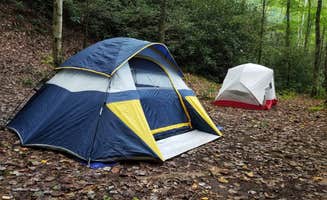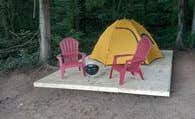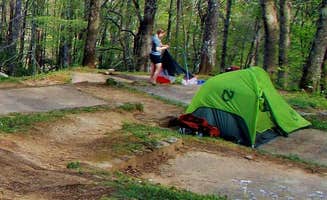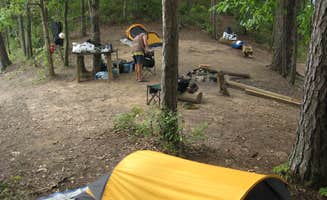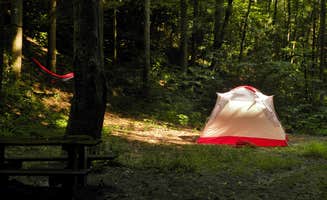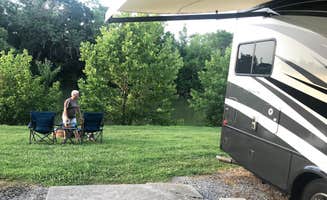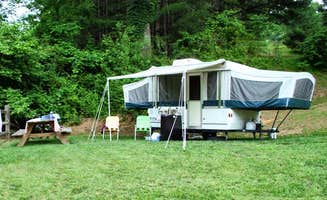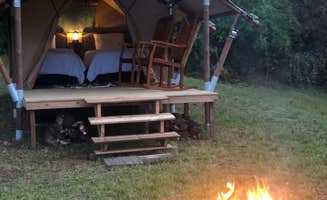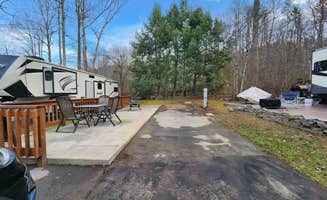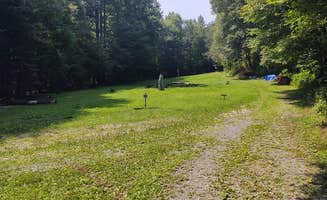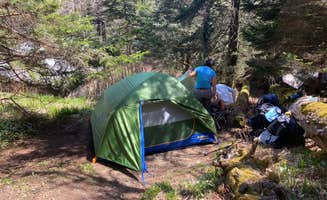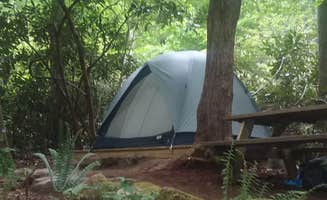Tent camping near Townsend, Tennessee offers access to the western edge of Great Smoky Mountains National Park where elevations range from 1,200 to over 4,600 feet. Temperatures can drop 10-15 degrees from valley to mountain peaks, requiring campers to prepare for temperature variations even in summer months. Local creeks provide natural white noise for sleep but also create higher humidity at lower elevation campsites.
What to do
Hike to Mt. Cammerer: From Cosby Campground, access the trailhead for this challenging but rewarding hike. According to one camper at Cosby Campground, "The trailhead for Mt. Cammerer via Low Gap leaves from here also, and that was a great hike, the first 3+miles are rough and steep, but once you hit the AT it gets easier."
Explore quieter areas of the park: The northeastern section near Cosby offers less crowded trails. A visitor noted, "This is our favorite spot. Much quieter than the other campgrounds in the park. Several wonderful hikes right out of the campground."
Visit Fontana Dam: Located within driving distance, this is the highest dam east of the Mississippi. A camper at Fontana Hilton Trail Shelter shared, "Being the highest dam east of the Mississippi River, seeing the dam with your own eyes is pretty awesome."
Short backpacking for beginners: For those new to backcountry camping, Bote Mountain Campsite 18 offers an accessible introduction. A camper described it as "about .5 miles downhill from the Bote Mountain and West Prong Trail Head" with two separated sites that can be used.
What campers like
Water access: Many backcountry sites feature creekside locations. At Bote Mountain Campsite 18, a camper shared that "West Prong of the Little River runs right through both separated sites, so plenty of water is an understatement. Ground is flat and plenty of room to spread out."
Uncrowded camping options: The northeastern section of the park remains less visited. A camper at Cosby Campground mentioned, "The Cosby campground tends to be a little quieter than Cades Cove or Elkmont, but I like it that way! There is ample parking nearby and trailheads."
Proximity to groceries: Despite the wilderness feel, supplies are accessible. One camper noted that "IGA grocery store in Townsend is only 20 minutes away, makes for a great place to pick up last minute food ideas before hiking in to your site."
Modern amenities at trail shelters: The Mount LeConte Shelter offers surprising comforts. A camper described, "I have stayed at a few trail shelters, but this is the first one I have seen that has a solar charging station for electronic devices. There is a reason it is called the 'Fontana Hilton.'"
What you should know
Reservation requirements vary: Most backcountry sites require permits obtained through the Great Smoky Mountains National Park website. A camper at Mount LeConte Shelter clarified, "Primitive shelter with privy and water nearby, and bear cables. But, note that it's not free. You have to get a permit through the GSMNP website."
Bear safety is essential: Proper food storage is mandatory. For shelters along the Appalachian Trail like Mollies Ridge Shelter, a hiker advised, "Don't mind the mice crawling over you as you sleep – they're just looking for some food. This is a good reason to hang your food bag from the bear hangers."
Weather preparedness: Temperature drops at higher elevations can surprise unprepared campers. Pack additional layers even for summer camping trips, as mountain temperatures can be significantly cooler than in Townsend.
Limited water at some sites: Not all backcountry sites have reliable water sources. Carry sufficient water when the campsite description doesn't specifically mention creek or spring access.
Tips for camping with families
Choose drive-up sites for young children: Families with small children should consider established campgrounds with vehicle access. A camper shared about Cosby, "This location is a great choice for anyone who wants to visit GSMNP while avoiding some of the crowds. This campground rarely fills up, allowing for the opportunity to pick your site when you get there."
Look for special ranger programs: Educational opportunities enhance family camping trips. At Cosby Campground, a visitor mentioned, "On Fridays they have special Ranger programs. We were lucky enough to learn about moon-shining from guys on the moonshiner TV show. It was very interesting!"
Consider pet restrictions: While pets are welcome at some campgrounds, trail access may be limited. One camper at Cosby noted, "Dogs are welcome in the campground but not on the majority of the trails."
Bring board games for mountain weather: Afternoon thunderstorms are common in summer. A visitor to Camp Birdsong shared that their platform tent site includes "a mini kitchen so that you can prepare some great meals while listening to the morning birds sing," providing space for indoor activities during rain.
Tips from RVers
Size limitations apply: Most campgrounds in the area have limited space for larger RVs. Check site dimensions before booking, especially for units over 25 feet in length.
Limited hookup options: Full hookups are scarce in national park campgrounds. Most offer primitive camping with communal facilities rather than individual site utilities.
Consider private campgrounds near park boundaries: These often provide more amenities while maintaining proximity to trails and attractions. The Simple Life Mountain Retreat offers sites with "electric, plenty of water spigots and the showers are nice and hot," according to a visitor.
Reserve well ahead for peak seasons: National park campgrounds with RV access fill quickly during summer and fall color season, often 6 months in advance.


